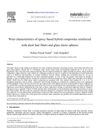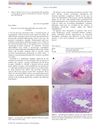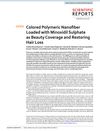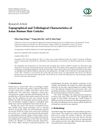 8 citations,
April 2019 in “ACS Biomaterials Science & Engineering”
8 citations,
April 2019 in “ACS Biomaterials Science & Engineering” The new SIS-PEG sponge is a promising material for skin regeneration and hair growth.
 8 citations,
September 2018 in “Journal of Cosmetic Dermatology”
8 citations,
September 2018 in “Journal of Cosmetic Dermatology” Lower irisin levels in the blood may indicate more severe acne.
 8 citations,
February 2017 in “Archives of Dermatological Research”
8 citations,
February 2017 in “Archives of Dermatological Research” Intense pulsed light treatment effectively reduces underarm hair by making hair follicles smaller and extending their resting phase.
 8 citations,
February 2016 in “The American Journal of Dermatopathology”
8 citations,
February 2016 in “The American Journal of Dermatopathology” Hair transplants can make hair follicles larger and hair shafts thicker.
 8 citations,
July 2012 in “Annals of biomedical engineering”
8 citations,
July 2012 in “Annals of biomedical engineering” Hair absorbs molecules differently based on their size, charge, and love for water, and less at higher pH; this can help make better hair products.
 7 citations,
October 2019 in “Case reports in endocrinology”
7 citations,
October 2019 in “Case reports in endocrinology” A young woman's symptoms suggested PCOS, but tests and surgery confirmed and treated a rare ovarian tumor, resolving her condition.
 7 citations,
January 2018 in “Materials Today: Proceedings”
7 citations,
January 2018 in “Materials Today: Proceedings” Adding human hair fibers and glass micro-spheres to epoxy improves its wear resistance and strength.
 7 citations,
July 2012 in “Regenerative Medicine”
7 citations,
July 2012 in “Regenerative Medicine” New treatments for diabetes, central nervous system repair, and cartilage injury were found, and a way to create functional hair follicles from stem cells was developed.
 7 citations,
April 2009 in “Bioorganic & Medicinal Chemistry Letters”
7 citations,
April 2009 in “Bioorganic & Medicinal Chemistry Letters” Diphenyl ethers can potentially reduce excess oil production when applied on the skin, helping treat conditions like acne.
 7 citations,
July 2004 in “International Journal of Cosmetic Science”
7 citations,
July 2004 in “International Journal of Cosmetic Science” Different hair types from various ethnic groups affect hair shine due to characteristics like thickness and shape.
 6 citations,
March 2020 in “Scientific reports”
6 citations,
March 2020 in “Scientific reports” Hair growth genes work better with more glucose due to changes in gene-regulating markers.
 6 citations,
February 2020 in “Journal of Natural Products”
6 citations,
February 2020 in “Journal of Natural Products” A new compound from a sponge strongly inhibits an enzyme linked to male-pattern hair loss without being toxic at low levels.
 6 citations,
December 2016 in “Springer eBooks”
6 citations,
December 2016 in “Springer eBooks” Environmental stressors like UV radiation, pollution, and extreme temperatures can damage skin and lead to diseases and aging.
 6 citations,
May 2016 in “Urolithiasis”
6 citations,
May 2016 in “Urolithiasis” Balding and low testosterone increase risk of urinary stones.
 6 citations,
October 2012 in “Journal of Heredity”
6 citations,
October 2012 in “Journal of Heredity” The Itpr3 gene causes a specific hair pattern in mice.
 5 citations,
January 2022 in “Clinical cancer investigation journal”
5 citations,
January 2022 in “Clinical cancer investigation journal” Certain Dibenzo derivatives may help treat prostate cancer.
 5 citations,
September 2016 in “Dermatologic Therapy”
5 citations,
September 2016 in “Dermatologic Therapy” Feily's method, which delays grafting for 24 hours to improve blood flow, successfully prevented scalp necrosis in three hair transplant patients.
 5 citations,
August 2014 in “Australasian journal of dermatology”
5 citations,
August 2014 in “Australasian journal of dermatology” Sorafenib can cause delayed skin problems, so patients need careful monitoring.
 5 citations,
January 2014 in “Hospital pharmacy”
5 citations,
January 2014 in “Hospital pharmacy” Using a strong allergy medicine too often on the scalp can cause swelling and inflammation.
 5 citations,
July 1991 in “Irish Journal of Medical Science (1971 -)”
5 citations,
July 1991 in “Irish Journal of Medical Science (1971 -)” Immunosuppressive therapy helps manage autoimmune diseases but carries risks like infection and potential for malignancy.
 4 citations,
October 2020 in “Toxicology Mechanisms and Methods”
4 citations,
October 2020 in “Toxicology Mechanisms and Methods” Hesperidin protects rat testicles from finasteride damage and improves sperm health.
 4 citations,
September 2020 in “BioMed Research International”
4 citations,
September 2020 in “BioMed Research International” Timosaponin BII, a plant extract, was found to promote hair growth in mice, similarly to minoxidil.
 4 citations,
March 2020 in “Scientific Reports”
4 citations,
March 2020 in “Scientific Reports” Scientists created a colored thread-like material containing a common hair loss treatment, which slowly releases the treatment over time, potentially offering an effective, neat, and visually appealing solution for hair loss.
 4 citations,
August 2019 in “Journal of Dermatology”
4 citations,
August 2019 in “Journal of Dermatology” The conclusion is that balancing cost and carbon emissions in hybrid power systems is crucial, especially when high reliability is needed, but the model needs to consider all device efficiencies and distribution losses.
 4 citations,
July 2016 in “Journal of cosmetic dermatology”
4 citations,
July 2016 in “Journal of cosmetic dermatology” Dermatologists should use hair relaxers carefully to avoid hair and scalp damage, following specific guidelines for application and maintenance.
 4 citations,
April 1999 in “Dermatologic Clinics”
4 citations,
April 1999 in “Dermatologic Clinics” Long-pulsed ruby lasers effectively reduce hair for up to 2 years with minimal pain.
 4 citations,
July 1994 in “Clinics in Dermatology”
4 citations,
July 1994 in “Clinics in Dermatology” Eosinophilia-myalgia syndrome, linked to contaminated L-tryptophan supplements, caused severe symptoms and some deaths, with long-term effects in survivors.
 3 citations,
May 2018 in “InTech eBooks”
3 citations,
May 2018 in “InTech eBooks” Animal models, especially mice, are essential for advancing hair loss research and treatment.
 3 citations,
November 2017 in “International Journal of Pharmacy and Pharmaceutical Sciences”
3 citations,
November 2017 in “International Journal of Pharmacy and Pharmaceutical Sciences”  3 citations,
January 2015 in “Mathematical problems in engineering”
3 citations,
January 2015 in “Mathematical problems in engineering” Hair damage increases significantly with higher temperatures and longer heating times.






























